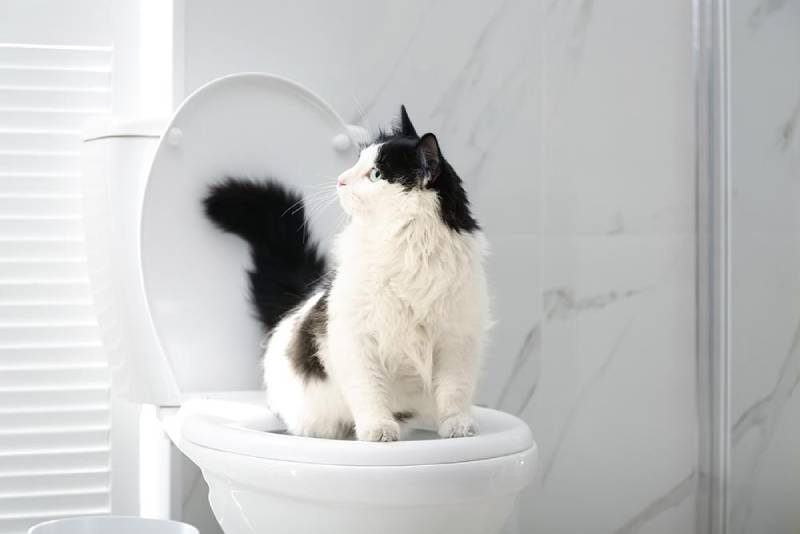Reasons You Should Never Flush Cat Poop Down Your Toilet - Important Facts
Reasons You Should Never Flush Cat Poop Down Your Toilet - Important Facts
Blog Article
Right here below you'll find a bunch of dependable facts when it comes to Can You Flush Cat Poo or Litter Down the Toilet?.

Introduction
As cat proprietors, it's necessary to be mindful of just how we get rid of our feline buddies' waste. While it might appear convenient to purge pet cat poop down the bathroom, this technique can have damaging consequences for both the setting and human health and wellness.
Alternatives to Flushing
Fortunately, there are much safer and more liable ways to take care of feline poop. Think about the following options:
1. Scoop and Dispose in Trash
One of the most typical approach of getting rid of pet cat poop is to scoop it into an eco-friendly bag and throw it in the garbage. Be sure to use a specialized litter scoop and take care of the waste quickly.
2. Usage Biodegradable Litter
Opt for naturally degradable pet cat trash made from products such as corn or wheat. These clutters are environmentally friendly and can be securely disposed of in the garbage.
3. Bury in the Yard
If you have a lawn, take into consideration burying feline waste in a marked area away from veggie yards and water resources. Be sure to dig deep sufficient to stop contamination of groundwater.
4. Install a Pet Waste Disposal System
Invest in a family pet garbage disposal system specifically developed for pet cat waste. These systems make use of enzymes to break down the waste, decreasing odor and ecological effect.
Wellness Risks
Along with environmental issues, flushing feline waste can additionally pose health dangers to human beings. Pet cat feces might consist of Toxoplasma gondii, a bloodsucker that can create toxoplasmosis-- a possibly severe illness, particularly for expecting ladies and people with damaged body immune systems.
Ecological Impact
Flushing feline poop introduces damaging pathogens and parasites into the supply of water, presenting a significant danger to marine environments. These contaminants can negatively affect aquatic life and compromise water top quality.
Conclusion
Responsible pet dog possession prolongs past offering food and shelter-- it also includes proper waste administration. By avoiding purging pet cat poop down the bathroom and selecting alternate disposal techniques, we can reduce our environmental footprint and protect human wellness.
Why Can’t I Flush Cat Poop?
It Spreads a Parasite
Cats are frequently infected with a parasite called toxoplasma gondii. The parasite causes an infection called toxoplasmosis. It is usually harmless to cats. The parasite only uses cat poop as a host for its eggs. Otherwise, the cat’s immune system usually keeps the infection at low enough levels to maintain its own health. But it does not stop the develop of eggs. These eggs are tiny and surprisingly tough. They may survive for a year before they begin to grow. But that’s the problem.
Our wastewater system is not designed to deal with toxoplasmosis eggs. Instead, most eggs will flush from your toilet into sewers and wastewater management plants. After the sewage is treated for many other harmful things in it, it is typically released into local rivers, lakes, or oceans. Here, the toxoplasmosis eggs can find new hosts, including starfish, crabs, otters, and many other wildlife. For many, this is a significant risk to their health. Toxoplasmosis can also end up infecting water sources that are important for agriculture, which means our deer, pigs, and sheep can get infected too.
Is There Risk to Humans?
There can be a risk to human life from flushing cat poop down the toilet. If you do so, the parasites from your cat’s poop can end up in shellfish, game animals, or livestock. If this meat is then served raw or undercooked, the people who eat it can get sick.
In fact, according to the CDC, 40 million people in the United States are infected with toxoplasma gondii. They get it from exposure to infected seafood, or from some kind of cat poop contamination, like drinking from a stream that is contaminated or touching anything that has come into contact with cat poop. That includes just cleaning a cat litter box.
Most people who get infected with these parasites will not develop any symptoms. However, for pregnant women or for those with compromised immune systems, the parasite can cause severe health problems.
How to Handle Cat Poop
The best way to handle cat poop is actually to clean the box more often. The eggs that the parasite sheds will not become active until one to five days after the cat poops. That means that if you clean daily, you’re much less likely to come into direct contact with infectious eggs.
That said, always dispose of cat poop in the garbage and not down the toilet. Wash your hands before and after you clean the litter box, and bring the bag of poop right outside to your garbage bins.
https://trenchlesssolutionsusa.com/why-cant-i-flush-cat-poop/
I was guided to that write-up about How to Dispose of Cat Poop and Litter Without Plastic Bags from a good friend on our other domain. Those who enjoyed our page plz be sure to share it. Many thanks for your time. Kindly stop by our website back soon.
Schedule Estimate Report this page